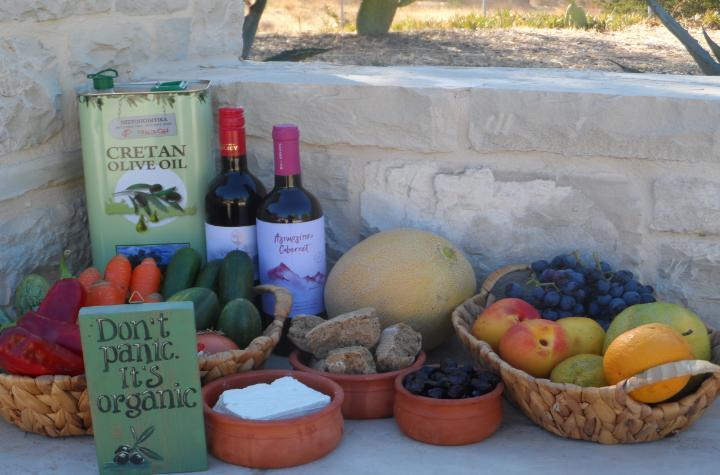Healthy bodies, healthy environment: benefits of using organic food in traditional Mediterranean diet
Categories
Share
/prod01/channel_8/media/scu-dep/news/images/2021/Carlo-Leifert-_DSC_0273-720X475.jpg)
A new international study has found that adopting a healthy Mediterranean diet significantly increased pesticide intake, while changing to organic food consumption led to a substantial decrease.
Using a unique, new intervention study design, an international team of experts led by Professor Carlo Leifert (Southern Cross University, Australia; University of Oslo, Norway) and Professor Chris Seal (Newcastle University, UK) compared the effect of a healthy diet (Mediterranean type) with a habitual Western diet and they also compared the effect of conventionally produced foods with organic food on intake of pesticides, a group of environmental pollutants with known negative health effects.
The study was carried out with higher degree students during an agricultural field course in Crete, Greece and lasted five weeks. The conventional group consumed the Mediterranean diet made entirely from conventional foods, while the intervention group consumed the same diet made entirely from certified organic foods. Before and after the intervention period all participants consumed their self-selected habitual Western diets, which according to their food diaries were low in fruit, vegetables and wine consumption and consisted entirely of conventional foods.
View Diet and food type affect pesticide intake graphic credit Carlo Leifert
The study’s main findings, published in The American Journal for Clinical Nutrition, were that:
- switching from a “Western” to a Mediterranean diet with high fruit and vegetable consumption resulted in more than 3-times higher total insecticide and organophosphate intake;
- conventional fruit, vegetables and wholegrain cereals are the most significant dietary sources for synthetic chemical pesticides;
- organic food production methods resulted in substantially lower pesticide (including insecticide, fungicide and herbicide) residue levels in fruit, vegetables and cereal products; and
- consuming a Mediterranean diet made from conventional food results in 10 times higher total pesticide intake than a Mediterranean diet made entirely from organic food.
Professor Chris Seal (PhD), at Newcastle University said: “This study provides clear evidence that both our diet and the way we produce food may affect the level of exposure to synthetic chemical pesticides and ultimately our health.”
Prof Carlo Leifert (PhD), the Foundation Director of the Centre for Organics Research at Southern Cross University, said: “Many of the synthetic pesticides detected in both food and urine samples in this study are confirmed or suspected endocrine disrupting chemicals (EDC). The 10 times higher pesticide exposure from conventional foods may therefore provide a mechanistic explanation for the lower incidence of overweight/obesity, metabolic syndrome and cancer associated with high levels of organic food consumption in epidemiological/cohort studies.”
Prof Per Ole Iversen (MD), at the University of Oslo, said: “There is growing evidence from observational studies that the health benefits of increasing fruit, vegetables and wholegrain consumption are partially diminished by the higher pesticide exposure associated with these foods. Our study demonstrates that consumption of organic foods allows consumers to change to a healthier diet, without an increased intake of pesticides.”
Dr Leonidas Rempelos (PhD), project manager of the study in Crete, said: “One of the difficulties of assessing the public health impacts of dietary exposure to pesticides is that once pesticides are widely used in food production everybody gets exposed. This study demonstrated the potential of using organic food consumers as a ‘low pesticide exposure control group’ to investigate the effect of currently used and newly released pesticides on public health.”
The authors of this study welcome the continued public and scientific debate on this important subject. The entire database generated and used for analyses will be available upon request for the benefit of other experts and interested members of the public.
Organic food purchased in Crete for the Mediterranean diet study (credit Carlo Leifert).
Funding
The study was funded by the Sheepdrove Trust, Drove Farm, Sheepdrove, Lambourn, Hungerford, RG17 7UN, UK (charity number:328369; www.charitychoice.co.uk/the-sheepdrove-trust-124094). The funder had no role in study design, implementation, analysis and interpretation of the data, and writing of the report.
Study
Diet and food type affect urinary pesticide residue excretion profiles in healthy individuals: results of a randomized controlled dietary intervention trial
Authors: Leonidas Rempelos, Juan Wang, Marcin Barański, Anthony Watson, Nikolaos Volakakis, Hans-Wolfgang Hoppe, W Nikolaus Kühn-Velten, Catherine Hadall, Gultakin Hasanaliyeva, Eleni Chatzidimitriou, Amelia Magistrali, Hannah Davis, Vanessa Vigar, Dominika Średnicka-Tober, Steven Rushton, Per Ole Iversen, Chris J Seal, Carlo Leifert
Published in The American Journal of Clinical Nutrition, 2021; nqab308
DOI: doi.org/10.1093/ajcn/nqab308
Media contact: Sharlene King, media office at Southern Cross University, 0429 661 349 or scumedia@scu.edu.au

/prod01/channel_8/media/scu-dep/current-students/images/Coffs-harbour_student-group_20220616_33-147kb.jpg)
/prod01/channel_8/media/scu-dep/current-students/services/counselling/images/RS21533_English-College-Student_20191210_DSC_6961-117kb.jpg)
/prod01/channel_8/media/scu-dep/study/scholarships/images/STEPHANIE-PORTO-108-2-169kb.jpg)
/prod01/channel_8/media/scu-dep/study/arts-and-humanities/images/RS20958_Chin-Yung-Pang-Andy_20190309__79I5562-960X540.jpg)
/prod01/channel_8/media/scu-dep/experience/images/SCU-INTNL-STUDY-GUIDE-280422-256-72kb.jpg)
/prod01/channel_8/media/dep-site-assets/component-library/screenshots/online-1X1.jpg)

/514x0:1487x973/prod01/channel_8/media/scu-dep/news/images/2025/Mosquito_Ades-mosquito-biting-skin_credit-National-Institute-of-Allergy-and-Infectious-Diseases-on-Unsplash-Z2pq_4mj6BI-EDIT-2000X973-copy.jpg)
/514x0:1487x973/prod01/channel_8/media/scu-dep/news/images/2025/Bruce-Thom-w-Chris-Klaas-and-Muhammad-Islami_2025-Nov-credit-East-Coast-Conferences---Copy.jpg)
/342x0:1220x878/prod01/channel_8/media/scu-dep/news/images/2025/Amy.jpg)
/540x0:1460x920/prod01/channel_8/media/scu-dep/news/images/2025/Georgina-Dimopoulos-SCU-COUNCIL-HEADSHOTS-17042025-133_2000px.jpg)
/514x0:1487x973/prod01/channel_8/media/scu-dep/news/images/2025/Kindergarten-children_credit-Pixabay-on-Pexels-159823-2000X973.jpg)
/514x0:1487x973/prod01/channel_8/media/scu-dep/news/images/2025/Coral-larvae-seedbox-dye-Credit-G-Carlin_CSIRO-2000X973.JPG)
/514x0:1487x973/prod01/channel_8/media/scu-dep/news/images/2025/Soft-drink-with-ice_credit-Towfiqu-Barbhuiya-on-Pexels-3440682-11477545-2000X973.jpg)
/484x0:1516x1032/prod01/channel_8/media/scu-dep/news/images/2025/esports-2.jpg)
/484x0:1516x1032/prod01/channel_8/media/scu-dep/news/images/2025/ai.jpg)
/514x0:1487x973/prod01/channel_8/media/scu-dep/news/images/2025/HEART-logo-2000X973.jpg)